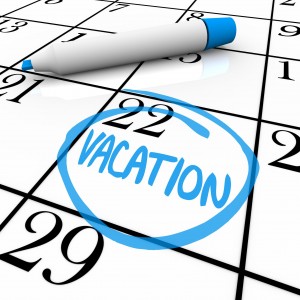
Widgetized Section
Go to Admin » Appearance » Widgets » and move Gabfire Widget: Social into that MastheadOverlay zone
Vacation Prep Essentials
Everything you need to know for a smooth escape and reentry
 Does this sound familiar? After looking forward to your vacation for weeks, you end up overscheduling, overdoing, and feeling as tired at the end of your trip as you did at the beginning. Workaholics and other busy professionals often end up treating their downtime the same way they do a day at the office: at full speed.
Does this sound familiar? After looking forward to your vacation for weeks, you end up overscheduling, overdoing, and feeling as tired at the end of your trip as you did at the beginning. Workaholics and other busy professionals often end up treating their downtime the same way they do a day at the office: at full speed.
The key to breaking this vicious cycle is to plan for vacation from start to finish before you head to the airport. There are a number of tips and tricks – vacation prep essentials – you can use in your vacation preparations to ensure that you (and your colleagues) are truly ready for your departure. This will allow you to enjoy a more leisurely pace for your adventures, and ease back into work afterward without a hitch.
Before You Go
You set the tone for your entire trip by how you choose to prepare your staff, boss, clients, and other colleagues for your departure. Laurie Erdman, founder of Chronic Wellness Coaching LLC, suggests that you begin preparing those you work with for your vacation a full two weeks before you leave. “Instruct them what to do in your absence and train someone to handle matters in your absence so work still moves forward and doesn’t pile up for your return,” Erdman advises.
Amanda O’Brien, vice president of marketing for an Internet marketing firm in Portland, Maine, suggests that two things to determine and communicate with your coworkers and superiors before you go are what type of vacation you’re taking, and how responsive you’re planning to be while you’re away. “Technology is great in that we can be connected even when we are away, but that may not always be the best option,” says O’Brien.
While You’re Away
How available should you be while you’re out of the office? Are there circumstances where you can (or should) unplug completely? Guillermo Rotman, CEO Americas at Regus, recommends a true digital disconnect from office life during your vacation. “Tell everyone you are unavailable,” says Rotman. “Set healthy boundaries and tell people you are offline for the holiday. Coworkers will be aware of your time off and hopefully will respect your absence and your inbox.”
Dana Manciagli, a 30-year career veteran as a sales and marketing executive, most recently with Microsoft Corporation, agrees that there are great reasons why you should check out completely: “If you have direct reports, it is a signal to them that you mean work-life balance and you are setting the tempo for their vacations,” says Manciagli. “Your boss needs to learn to rely on others around you. As my oncologist told me when I was delaying a cancer surgery for work: the graveyards are filled with indispensable people.”
Blending Work and Play
If you don’t feel you can unplug from work completely, how can you enjoy your vacation while still staying connected? Nicole Witt, executive director of Success with Witt, suggests having an assistant or coworker handle “triage” for you by forwarding your emails and voice-mails to that person.
“If it’s something they can handle, great—let them handle it,” says Witt. “If it’s something that requires your attention but isn’t critical, then have them let the person know that you are unreachable but will address their problem as soon as you return.” Witt adds that for the highly unusual issue or two that really needs your attention during your vacation, your triage person should be empowered to contact you.
Another way to blend work and play is to set up a time-limited work period each morning, according to Carson Tate, founder and principal at Working Simply. “One client of mine set up a two-hour period each morning, before her family was up and about, to check her emails and make any necessary calls,” says Tate. “At the end of those two hours, she would shut her laptop and focus on her family.”
No WiFi? No Problem
It can be a particular challenge to stay connected when you travel to the islands or overseas, as WiFi—or even a basic Internet connection—may be unavailable in your hotel room.
Amanda Augustine, former job search expert for TheLadders, recommends that if WiFi is unavailable, you can check to see if your service provider offers mobile Internet and mobile hotspots to access the Internet anywhere your cell phone has service. She adds that you can also do some online research to identify Internet cafes or other businesses that offer free or fee-based Internet access.
“Many Starbucks and Barnes & Noble locations offer WiFi,” says Augustine. “Additionally, check the Airport WiFi Guide to see if your airline offers WiFi on their flights. Save some time and money by setting up an account with a service like Gogo ahead of time and choosing the pricing option that makes the most sense for your needs.”
Back to Work
Getting back into the groove at work “post-vaca” can be as challenging as preparing to go in the first place. To ease the transition, Augustine recommends carrying a notebook when you travel and writing down work-related to-dos as they occur to you. “If you think of something you want to take care of when you’re back in the office, jot it down and then put the notebook away,” says Augustine. “Now that it’s documented, you can leave it alone until you’re back in the office.”
Mallary Tytel, president of Healthy Workplaces, LLC, suggests that part of your post-vacation plan should include building in a buffer day at home, if possible, to deal with household matters. “Take an extra day to deal with laundry, restock the cupboards, reset your internal clock, and even get a head start on your work email,” says Tytel. Once back in the office, Tytel recommends first reconnecting with colleagues to find out what has been going on while you were away, particularly in your areas of responsibility. “Based on what you learn, take time to create a to-do list, prioritizing your tasks and focusing on the most critical ones first,” she advises.
Finally, in making decisions related to your approach to vacation, Tate believes that apart from the impact on your personal and family life of trying to juggle too much work during your downtime, you should also keep in mind the potential impact on your performance at work. Doing double-duty can lead to double-damage in the work-life balance department.
“Remember this: every time you say yes to something, you are saying no to something else,” says Tate. “In the case of not setting clear boundaries concerning work during your vacation, you’re saying no to self-rejuvenation!”




You must be logged in to post a comment Login